List of German monarchs
Appearance
(Redirected from King of germany)
This is a list of kings who ruled over the German territories of central Europe. The kings reigned from the division of the Frankish Empire in 843 until the end of the German Empire in 1918. It also includes the heads of the different German confederations after the collapse of the Holy Roman Empire in 1806.
Kingdom of Germany, 843–1806
[change | change source]Emperors are listed in bold. Rival kings, anti-kings, and junior co-regents are listed in italics.
| Image | Name | House | King | Emperor | Ended | Notes |
|---|---|---|---|---|---|---|

|
Louis the German (Ludwig II der Deutsche) |
Carolingian | 11 August 843 | — | 23 August 876 | Son of Emperor Louis the Pious and grandson of Charlemagne |

|
Louis the Younger (Ludwig III der Jüngere) |
Carolingian | 28 August 876 | — | 20 January 882 | Son of Louis the German; ruled in East Francia, Saxony, and from 880 also Bavaria |

|
Carloman (Karlmann) |
Carolingian | 28 August 876 | — | 22 March 880 | Son of Louis the German; ruled in Bavaria; from 877 he also ruled as King of Italy |

|
Charles the Fat (Karl III, der Dicke) |
Carolingian | 28 August 876 | 12 February 881 | 11 November 887 | Son of Louis the German; ruled in Alemannia, Raetia, from 882 in the entire Eastern Kingdom; from 879 also King of Italy |

|
Arnulf of Carinthia (Arnulf von Kärnten) |
Carolingian | 30 November 887 | 25 April 896 | 8 December 899 | Son of Carloman |

|
Louis the Child (Ludwig IV das Kind) |
Carolingian | 21 January 900 | — | 20/24 September 911 | Son of Arnulf of Carinthia |

|
Conrad I (Konrad I) |
Conradine (Franconian) | 10 November 911 | — | 23 December 918 | |

|
Henry I the Fowler (Heinrich I der Vogler) |
Liudolfing | 23 April 919 | — | 2 July 936 | |

|
Arnulf the Bad (Arnulf der Böse, Herzog von Bayern) |
Luitpolding (Bavarian) | 919 | — | 921 | Rival king to Henry I |
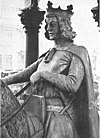
|
Otto I the Great (Otto I der Große) |
Ottonian | 7 August 936 | 2 February 962 | 7 May 973 | Son of Henry I; first king crowned in Aachen Cathedral since Lothair I; crowned as Otto by the grace of God King;[1] crowned Holy Roman Emperor in 961. |

|
Otto II the Red (Otto II) |
Ottonian | 26 May 961 | 25 December 967 | 7 December 983 | Son of Otto I; Otto by the grace of God King[1] under his father 961–973; also crowned Emperor in his father's lifetime |
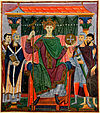
|
Otto III (Otto III) |
Ottonian | 25 December 983 | 21 May 996 | 21 January 1002 | Son of Otto II; Otto by the grace of God King[1] |

|
Henry II (Heinrich II der Heilige) |
Ottonian | 7 June 1002 | 26 April 1014 | 13 July 1024 | Great-grandson of Henry I |

|
Conrad II (Konrad II) |
Salian (Frankish) | 8 September 1024 | 26 March 1027 | 4 June 1039 | Great-great-grandson of Otto I |

|
Henry III (Heinrich III) |
Salian | 14 April 1028 | 25 December 1046 | 5 October 1056 | Son of Conrad II; King (of the Germans?)[1] under his father 1028–1039 |

|
Henry IV (Heinrich IV) |
Salian | 17 July 1054 | 21 March 1084 | 31 December 1105 | Son of Henry III; King of Germany under his father 1054–1056 |

|
Rudolf of Rheinfelden (Rudolf von Rheinfelden) |
Rheinfeld | 15 March 1077 | — | 15 October 1080 | Rival King to Henry IV |

|
Hermann of Salm (Hermann von Luxemburg, Graf von Salm) |
Salm | 6 August 1081 | — | 28 September 1088 | Rival King to Henry IV |

|
Conrad (Konrad) |
Salian | 30 May 1087 | — | 27 July 1101 | Son of Henry IV; King of Germany under his father 1087–1098, King of Italy 1093–1098, 1095–1101 in rebellion. |

|
Henry V (Heinrich V) |
Salian | 6 January 1099 | 13 April 1111 | 23 May 1125 | Son of Henry IV; King of Germany under his father 1099–1105, forced his father to abdicate. |
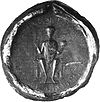
|
Lothair III (Lothar III) |
Supplinburger | 30 August 1125 | 4 June 1133 | 4 December 1137 | |
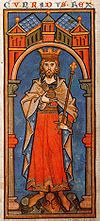
|
Conrad III (Conrad III) |
Hohenstaufen | 7 March 1138 | — | 15 February 1152 | Grandson of Henry IV (through his mother); Previously Rival King to Lothair III 1127–1135 |
| Henry Berengar (Heinrich (VI)) |
Hohenstaufen | 30 March 1147 | — | August? 1150 | Son of Conrad III; King of Germany under his father 1147–1150 | |
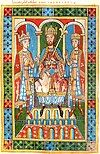
|
Frederick I Barbarossa (Friedrich I Barbarossa) |
Hohenstaufen | 4 March 1152 | 18 June 1155 | 10 June 1190 | Nephew of Conrad III |

|
Henry VI (Heinrich VI) |
Hohenstaufen | 15 August 1169 | 14 April 1191 | 28 September 1197 | Son of Frederick I; King of Germany under his father 1169–1190 |
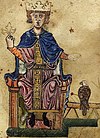
|
Frederick II (Friedrich II) |
Hohenstaufen | 1197 | — | 1197 | Son of Henry VI; King of Germany under his father 1196 |
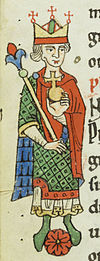
|
Philip of Swabia (Philipp von Schwaben) |
Hohenstaufen | 6 March 1198 | — | 21 August 1208 | Son of Frederick I; Rival king to Otto IV |

|
Otto IV (Otto IV von Braunschweig) |
Welf | 29 March 1198 | 4 October 1209 | 5 July 1215 | Rival king to Philip of Swabia; later opposed by Frederick II; deposed 1215; died 19 May 1218 |

|
Frederick II (Friedrich II) |
Hohenstaufen | 5 December 1212 | 22 November 1220 | 26 December 1250 | Son of Henry VI; Rival king to Otto IV until 5 July 1215 |

|
Henry (Heinrich (VII)) |
Hohenstaufen | 23 April 1220 | — | 15 August 1235 | Son of Frederick II; King of Germany under his father 1220–1235 |
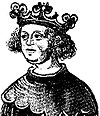
|
Conrad IV (Konrad IV) |
Hohenstaufen | May 1237 | — | 1 May 1254 | Son of Frederick II; King of Germany under his father 1237–1250 |

|
Henry Raspe (Heinrich Raspe) |
Thuringia | 22 May 1246 | — | 16 February 1247 | Rival King to Frederick II |

|
William of Holland (Wilhelm von Holland) |
Holland | 3 October 1247 | — | 28 January 1256 | Rival King to Frederick II and Conrad IV, 1247–1254 |

|
Richard of Cornwall (Richard von Cornwall) |
Plantagenet | 13 January 1257 | — | 2 April 1272 | Rival king to Alfonso of Castile; held no real authority. |

|
Alfonso of Castile (Alfons von Kastilien) |
House of Burgundy | 1 April 1257 | — | 1275 | Grandson of Philip; Rival king to Richard of Cornwall; held no authority; later opposed by Rudolf I; relinquished claims 1275, died 1284 |

|
Rudolf I (Rudolf I von Habsburg) |
Habsburg | 29 September 1273 | 15 July 1291 | First of the Habsburgs | |

|
Adolf of Nassau (Adolf von Nassau) |
Nassau | 5 May 1292 | — | 23 June 1298 | According to some historians, Adolf's election was preceded by the short-lived kingship of Conrad, Duke of Teck. See his article for details. |

|
Albert I (Albrecht I von Habsburg) |
Habsburg | 24 June 1298 | — | 1 May 1308 | Son of Rudolf I; Rival King to Adolf of Nassau, 1298 |
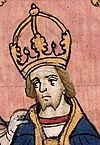
|
Henry VII (Heinrich VII, Luxemburger) |
Luxembourg | 27 November 1308 | 13 June 1311 | 24 August 1313 | |

|
Louis IV (Ludwig IV, der Bayer, Wittelsbacher) |
Wittelsbach | 20 October 1314 | 17 January 1328 | 11 October 1347 | Grandson of Rudolf I; Rival king to Frederick the Fair 1314–1322 |
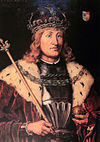
|
Frederick the Fair (Friedrich der Schöne, Habsburger) |
Habsburg | 19 October 1314/ 5 September 1325 |
— | 28 September 1322/ 13 January 1330 |
Son of Albert I; Rival king to Louis IV 1314–1322; associate king with Louis IV 1325–1330 |
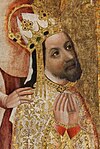
|
Charles IV (Karl IV von Luxemburg) |
Luxembourg | 11 July 1346 | 5 April 1355 | 29 November 1378 | Grandson of Henry VII; Rival king to Louis IV, 1346–1347; also King of Bohemia, King of Italy and Holy Roman Emperor |

|
Günther von Schwarzburg (Günther von Schwarzburg) |
Schwarzburg | 30 January 1349 | — | 24 May 1349 | Rival King to Charles IV |
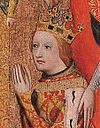
|
Wenceslaus (Wenzel von Luxemburg) |
Luxembourg | 10 June 1376 | — | 20 August 1400 | Son of Charles IV; King of Germany under his father 1376–1378; deposed 1400; also by inheritance King of Bohemia; died 1419 |

|
Rupert of Palatinate (Ruprecht von der Pfalz, Wittelsbacher) |
Wittelsbach | 21 August 1400 | — | 18 May 1410 | Great-grandnephew of Louis IV |

|
Sigismund (Sigismund von Luxemburg) |
Luxembourg | 20 September 1410/ 21 July 1411 |
3 May 1433 | 9 December 1437 | Son of Charles IV |

|
Jobst of Moravia (Jobst von Mähren, Luxemburger) |
Luxembourg | 1 October 1410 | — | 8 January 1411 | Nephew of Charles IV; Rival King to Sigismund |

|
Albert II (Albrecht II) |
Habsburg | 18 March 1438 | — | 27 October 1439 | 4th in descent from Albert I; son-in-law of Sigismund |
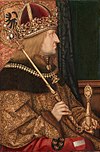
|
Frederick III (Friedrich III) |
Habsburg | 2 February 1440 | 16 March 1452 | 19 August 1493 | 4th in descent from Albert I; 2nd cousin of Albert II |
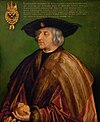
|
Maximilian I (Maximilian I) |
Habsburg | 16 February 1486 | 4 February 1508 Emperor-elect |
12 January 1519 | Son of Frederick III; King of Germany under his father 1486–1493; adopted the title Emperor-elect in 1508 with the Pope's approval |

|
Charles V (Karl V) |
Habsburg | 28 June 1519 | 24 February 1530 | 3 August 1556 | Grandson of Maximilian I; died 21 September 1558 |
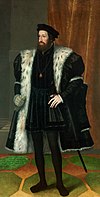
|
Ferdinand I (Ferdinand I) |
Habsburg | 5 January 1531 | 14 March 1558 Emperor-elect |
25 July 1564 | Grandson of Maximilian I; brother of Charles V; King of Germany under his brother Charles V 1531–1556; last king to be crowned in Aachen Cathedral. Emperor-Elect |
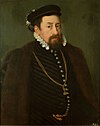
|
Maximilian II (Maximilian II) |
Habsburg | 22 November 1562 | 25 July 1564 Emperor-elect |
12 October 1576 | Son of Ferdinand I; King of Germany under his father 1562–1564 |

|
Rudolf II (Rudolf II) |
Habsburg | 27 October 1575 | 2 November 1576 Emperor-elect |
20 January 1612 | Son of Maximilian II; King of Germany under his father, 1575–1576 |
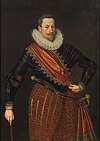
|
Matthias (Matthias) |
Habsburg | 13 June 1612 | 13 June 1612 Emperor-elect |
20 March 1619 | Son of Maximilian II |

|
Ferdinand II (Ferdinand II) |
Habsburg | 28 August 1619 | 28 August 1619 Emperor-elect |
15 February 1637 | Grandson of Ferdinand I |

|
Ferdinand III (Ferdinand III) |
Habsburg | 22 December 1636 | 15 February 1637 Emperor-elect |
2 April 1657 | Son of Ferdinand II; King of Germany under his father 1636–1637 |

|
Ferdinand IV (Ferdinand IV) |
Habsburg | 31 May 1653 | — | 9 July 1654 | Son of Ferdinand III; King of Germany under his father |
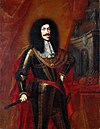
|
Leopold I (Leopold I) |
Habsburg | 18 July 1658 | 18 July 1658 Emperor-elect |
5 May 1705 | Son of Ferdinand III |

|
Joseph I (Joseph I) |
Habsburg | 23 January 1690 | 5 May 1705 Emperor-elect |
17 April 1711 | Son of Leopold I; King of Germany under his father 1690–1705 |
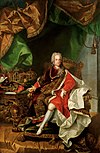
|
Charles VI (Karl VI) |
Habsburg | 27 October 1711 | 27 October 1711 Emperor-elect |
20 October 1740 | Son of Leopold I |

|
Charles VII (Karl VII) |
Wittelsbach | 14 January 1742 | 14 January 1742 Emperor-elect |
20 January 1745 | Husband of Maria Amalia, daughter of Joseph I |
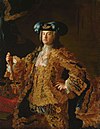
|
Francis I (Franz I) |
Lorraine | 13 September 1745 | 13 September 1745 Emperor-elect |
18 August 1765 | Husband of Maria Theresa, daughter of Charles VI |
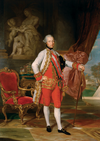
|
Joseph II (Joseph II) |
Habsburg-Lorraine | 27 March 1764 | 18 August 1765 Emperor-elect |
20 February 1790 | Son of Francis I and Maria Theresa; King of Germany under his father 1764–1765 |

|
Leopold II (Leopold II) |
Habsburg-Lorraine | 30 September 1790 | 30 September 1790 Emperor-elect |
1 March 1792 | Son of Francis I and Maria Theresa |

|
Francis II (Franz II) |
Habsburg-Lorraine | 7 July 1792 | 7 July 1792 Emperor-elect |
6 August 1806 | Son of Leopold II. He dissolved the Holy Roman Empire. Also Emperor of Austria 1804–1835. Died 1835. |
German confederations, 1806–1871
[change | change source]Confederation of the Rhine, 1806–1813
[change | change source]| Name | Portrait | Title | House | Began | Ended |
|---|---|---|---|---|---|
| Napoleon I, Emperor of the French (Napoléon I, Kaiser der Franzosen) |
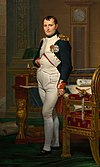
|
Protector of the Confederation of the Rhine |
Bonaparte | 25 July 1806 | 19 October 1813 |
German Confederation, 1815–1866
[change | change source]| Name | Portrait | Title | House | Began | Ended |
|---|---|---|---|---|---|
| Francis I, Emperor of Austria (Franz I, Kaiser von Österreich) |

|
President of the German Confederation |
Habsburg-Lorraine | 20 June 1815 | 2 March 1835 |
| Ferdinand I, Emperor of Austria (Ferdinand I, Kaiser von Österreich) |

|
President of the German Confederation |
Habsburg-Lorraine | 2 March 1835 | 12 July 1848 |
| Archduke John of Austria (Erzherzog Johann von Österreich) |

|
Imperial Vicar[2] | Habsburg-Lorraine | 12 July 1848 | 20 December 1849 |
| Frederick William IV, King of Prussia (Friedrich Wilhelm IV, König von Preußen) |

|
Emperor of the Germans elect | Hohenzollern | Elected Emperor of the Germans by the Frankfurt National Assembly on 28 March 1849, but refused the crown on 3 April 1849 | |
| President of the Erfurt Union |
26 May 1849 | 29 November 1850 | |||
| Francis Joseph I, Emperor of Austria (Franz Joseph I, Kaiser von Österreich) |

|
President of the German Confederation |
Habsburg-Lorraine | 1 May 1850 | 24 August 1866 |
North German Confederation, 1867–1871
[change | change source]| Name | Portrait | Title | House | Began | Ended |
|---|---|---|---|---|---|
| Wilhelm I, King of Prussia (Wilhelm I, König von Preußen) |
 |
President of the North German Confederation |
Hohenzollern | 1 July 1867 | 18 January 1871 |
German Empire, 1871–1918
[change | change source]| Image | Name | Date of birth | Monarch From | Monarch Until | Date of death |
|---|---|---|---|---|---|
 |
Wilhelm I (William I) (Hohenzollern) |
22 March 1797 | 18 January 1871 | 9 March 1888 | |
 |
Friedrich III (Frederick III) (Hohenzollern) |
18 October 1831 | 9 March 1888 | 15 June 1888 | |
 |
Wilhelm II (William II) (Hohenzollern) |
27 January 1859 | 15 June 1888 | 9/28 November 1918[3] (abdicated) |
4 June 1941 |
Related pages
[change | change source]Footnotes
[change | change source]Wikimedia Commons has media related to Holy Roman Emperors.
- ↑ 1.0 1.1 1.2 1.3 Alfred P. Smyth, Palgrave Macmillan (1998) Medieval Europeans: studies in ethnic identity and national perspectives in medieval Europe, p. 64
- ↑ Elected by the Frankfurt National Assembly as Imperial Vicar of a new German Reich. The German Confederation was considered dissolved.
- ↑ His abdication was announced by the Chancellor on 9 November. The king went into exile in the Netherlands. He did not officially abdicate until 28 November.
